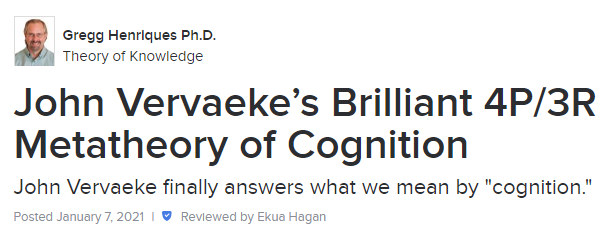Of Dogs and Persons
How Contemporary Cognitive Science Can Keep AA Relevant (and Improve SMART Recovery)
Read Dr. Henriques’ piece here.
According to John Vervaeke, there are at least four ways in which we come into knowledge.
We’re all aware of the Propositional — the statement and understanding of facts. (Ie. “A dog is a [typically] quadrupedal mammal.”)
But that’s only one way of knowing. And while it’s very important, it greatly lacks significant dimensions.
Our Perspectival knowing teaches us how dogs and people interact with one another. What does it mean to “own” a dog, or to be “rescued” by one? (And how do dogs, in different contexts, interact with cats or other mammals? Observe the dog park.)
Our Procedural knowing ingrains in us an understanding of how dogs behave and respond to various motivations, as we “train” them and feed them, walk them, and care for them.
And our Participatory knowing puts us in that mysterious union with the dog, creating a “relationship.” In this, we can experience “Love” of various sorts. Mystery, wonder, awe, reverence, and grace are likely to ensue.
This is what it means to be a Being in the World. We are much more than brains interpreting data. Indeed, our very internal systems exhibit these four types of knowing as they interact to form the process which is “Us.”
Which brings me to a hobby horse of mine: understanding AA. I’ve had great success in benefitting from AA (especially when I combine it with Buddhist philosophy). But I have also had a lot of trouble with it.
Observe the following short: John Goodman is Only Sober One Day at a Time.
Notice what Mr. Goodman has to do with respect to the Propositions of AA: have faith in them. That is, rather than focusing on the logic or truth claims about the propositions, he simply takes them for granted. Doing this allows him to situate himself in the perspective of being “an alcoholic in recovery,” the procedure of “living one day at a time” and avoiding drinking, and participating in the culture of sobriety to gain personal benefit by benefitting others.
Therefore, for any of you out there who might think that AA has some fatal logical flaws in its language (and the Big Book may seem to be rife with them), consider these other types of knowledge which it bestows. It is my belief that AA could potentially help more people were this type of thinking to be promoted. (Of course, it would also help if AA put out a new book with more contemporary language.)
Similarly SMART Recovery has a few things to learn as well. It is beautiful that this organization has transformed REBT into a logically sound methodology for achieving and maintaining sobriety.
But it’s important to know that this is not the only way in which SMART works. It also functions at the other levels of knowing by sharing comradery at meetings, calling individuals to become meeting leaders, and creating social networks that allow for more “rationally minded” folk to find support despite their aversion to AA.
That said, I do not think that the two programs are in opposition and, if anything, I believe that all four types of knowing can be engaged in the interaction and counterpoint between the two.
If AA seems like a “leap of faith,” it’s good to know that there is science behind it — even if that science doesn’t include trustworthy studies. And if SMART seems like it’s too technical, you can rest easily knowing that it has unstated dimensions.
A dog may merely seem like a dog until one realizes just how much deep dimensionality goes into its Being. Accepting that is perhaps the first step in successful Uncovery.




